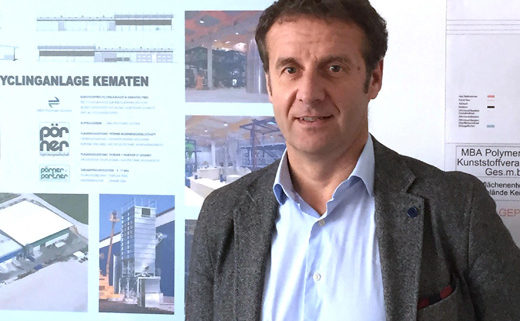Five minutes with… Wolfgang Ganser, General Manager at MBA Austria
MBA Polymers Austria continues to perform well, despite the current low prices for plastics. This is largely due to the hard work and dedication of Wolfgang Ganser, MBA Austria’s General Manager, and his team, many of whom have worked at MBA Austria since its inception in 2005. They continuously seek to improve MBA’s technology, increasing efficiency and yields.
So let’s meet Wolfgang.
1. Could you describe your role and responsibilities at MBA Polymers?
As General Manager of MBA’s Austrian facility, I have many responsibilities. Of course, the most important is to deliver results. Beyond that, I’m responsible for helping to increase the yield and output of the plant, including by developing new materials, in order to maintain our competitive advantage. I’m therefore also close to the sales strategy, as I need to understand how our products are used by customers – mostly global manufacturers – and how they could be used by other companies.
Before joining MBA, I worked as a Division Controller in diverse industries, including the packaging and automotive sectors. I joined MBA in 2006, excited by the idea of plastics recycling. I took on the role of General Manager in 2012. We have a great, highly motivated team, focused on quality and good customer service, and we’re learning all the time. For example, in addition to working with a complex raw material stream, we also find new ways to separate and derive value from other e-waste materials, such as metals.
2. How does MBA work with its customers to tailor the characteristics of their products?
It’s fundamental to analyse the customer’s requirements and understand how we can adapt the characteristics of our products to meet their needs. We begin with products from our existing portfolio, and if necessary, we develop alternative products, such as PP with glass fibre or even plastics with different mechanical properties or colour.
3. Could you share an example?
We are currently working on an FPP grade comprised of 40% glass fibre. It’s for a part that will be visible to the end consumer, so it’s vital that the material looks pristine. Collaborating with our customer, we went through several iterations of the material. We ran tests on the material at our laboratory, and the customer ran ‘real world’ tests in the relevant application. In this way, we’re refining the colour properties of the material, darkening them to suit the customer’s product.
4. What plastics recycling challenges do you face and how are you working to overcome them?
The challenges begin with sourcing. There are many legislative restrictions in place, relating to the transport of materials or chemical contaminations, for example. It’s therefore important to work with trusted suppliers. For example, we have a dedicated process to recycle WEEE-materials from metal recyclers. The composition of materials also poses a constant challenge in terms of increasing yield and efficiency, particularly with so many plastic polymers available. We also focus on helping customers to understand the benefits of our products. In many cases, we can offer alternatives with different properties that perform just as well as their existing materials, so it’s important for us to understand how best to communicate this.
5. What are your ambitions for the business?
We have a detailed business plan for the next few years. In particular, we aim to increase the recovery rate for our plant up to 70%. We have defined a strategy to achieve this, and will seek to reach an output to 35,000 tonnes annually. We currently produce 22,000 tonnes annually. We will also build on our successful entry in the automotive industry.

